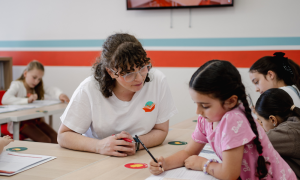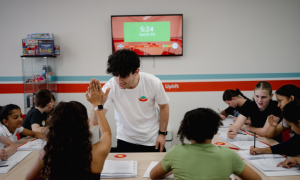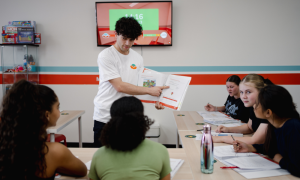In today’s digital age, children are spending more time than ever in front of screens. According to the Australian Government, children aged 5-17 spend an average of 2.5 hours a day watching TV and using the internet outside of school hours. While technology can provide numerous benefits, excessive screen time can have negative effects on a child’s health, sleep, and academic performance. As an expert tutor, I have seen firsthand the impact that excessive screen time can have on a child’s learning. In this blog post, I will share five strategies for managing your child’s screen time to help them achieve academic success and overall well-being.
Expectation #1: Set clear rules and boundaries
As a parent, it’s essential to set clear rules and boundaries around screen time. According to the American Academy of Pediatrics, children aged 2-5 should have no more than one hour of screen time per day, and children aged 6 and older should have consistent limits on the amount of time spent on screens. It’s also important to set rules around when and where screens can be used. For example, you may choose to limit screen time during mealtimes, in the bedroom, or during family activities.
Expectation #2: Encourage physical activity and outdoor play
Physical activity is critical for a child’s overall health and well-being. Encourage your child to engage in outdoor play and physical activity instead of spending time on screens. According to Dr. Kristy Goodwin, a digital wellbeing and productivity researcher, “Every hour of sedentary time in front of a screen increases a child’s risk of developing obesity by 7%.” Encouraging physical activity can help prevent obesity, improve mental health, and increase academic performance.
Expectation #3: Model healthy screen habits
As a parent, it’s essential to model healthy screen habits for your child. According to a study by the Australian Institute of Family Studies, children are more likely to have excessive screen time if their parents also have excessive screen time. Set a good example for your child by limiting your own screen time and engaging in other activities, such as reading, exercise, or spending time with family and friends.
Expectation #4: Use parental controls and monitoring tools
There are many parental control and monitoring tools available that can help you manage your child’s screen time. These tools can help you set time limits, block inappropriate content, and monitor your child’s activity on various devices. Dr. Goodwin recommends using tools that allow for a “gradual withdrawal” of screens, such as a timer that gradually reduces screen time as bedtime approaches.
Expectation #5: Create screen-free zones and activities
Finally, it’s important to create screen-free zones and activities in your home. This can help your child develop a healthy relationship with screens and prevent excessive screen time. Create a designated homework area, family game nights, or outdoor activities that don’t involve screens. Encourage your child to engage in hobbies and interests that don’t involve screens, such as music, sports, or art.
Book a Free Assessment
Excessive screen time can have negative effects on a child’s academic performance and overall well-being. As an expert tutor, I have seen the impact that excessive screen time can have on a child’s learning. By implementing these five strategies, you can help your child achieve academic success and overall well-being. Remember to set clear rules and boundaries, encourage physical activity and outdoor play, model healthy screen habits, use parental controls and monitoring tools, and create screen-free zones and activities. If you’re concerned about your child’s academic performance, consider booking a free assessment at your local Success Tutoring centre.





